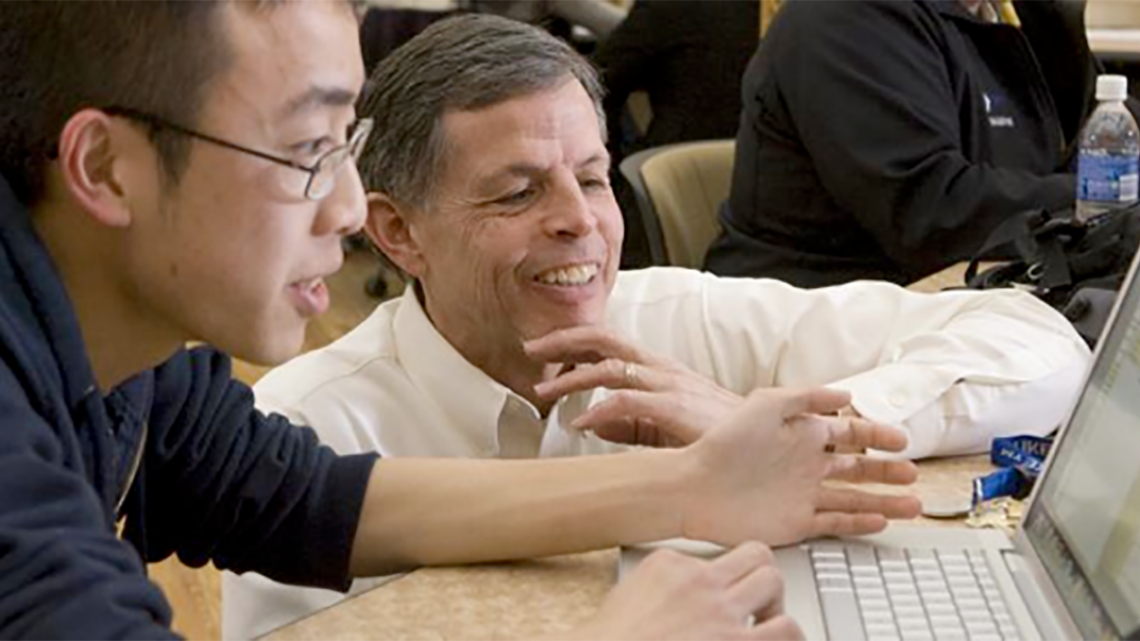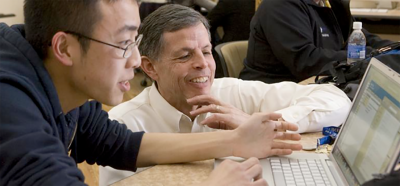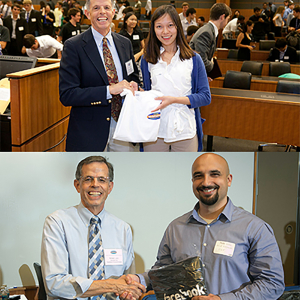
Matt Hartman

When Associate Chair Richard Lucic joined the Duke University faculty in 1992, the world’s first popular web browser was just about to be released, and the Computer Science department was among the smallest on campus. Things couldn’t be more different today. The global economy has gone digital, the internet has remade the world, and computer science is the most popular major Duke offers.
Now the department will have to undergo another large change: operating without Lucic for the first time in 21 years.
During his Duke career, Lucic connected students and faculty with business opportunities, helped launch a certificate program, and “probably filled, at one time or another, every named position in the department,” he says.
The fact that he’s done all of that without a computer science degree highlights the impressive way Lucic approached his work—and why he helped so many along the way.
“My career has been totally unplanned,” Lucic says with a laugh. “It just came about by taking advantage of opportunities that came my way.”
Lucic’s working life began at 13 years old, selling newspapers on Main Street in Disneyland. He did it almost full time outside of school hours, so it’s no surprise that he later joined a work-study program in college. It was at Hewlett Packard, and he ended up staying at the company for 20 years, earning a master’s degree from Stanford University in Hewlett Packard’s Honors Co-Op Program.
Originally, he helped engineer integrated circuit fabrication processes for the company. Later, he managed an integrated circuit manufacturing facility in Colorado. And in 1983, while still an employee of Hewlett Packard, Lucic transferred to Research Triangle Park to take up a position as the Director of Technology Transfer at the Semiconductor Research Corporation (SRC)—an industry organization that funded research and facilitated connections between universities and private industry.
“The idea of this consortium was that companies gave money that the SRC then used to fund research at universities to create new and innovative integrated circuit technologies,” Lucic says, “Once the technologies were invented, we wanted to transfer that back to the companies so they could commercialize them.”
It was his role connecting university research to private industry that led Lucic to Duke—or, more accurately, Duke to Lucic.
“One of the universities I funded research at [while at SRC] was Duke University,” Lucic says, “Theo Pilkington, who was the founder of the Duke Biomedical Engineering department, ran an Engineering Research Center. He decided it would be good for me to come work for him. At first I told him I was an industry guy—what do I know about academia? But he kept after me.”
Lucic eventually joined the Duke staff as the Director of External Affairs for Pilkington’s Engineering Research Center, a National Science Foundation–funded center. After six years, the Center was winding down, and then-Computer Science chair Jeff Vitter brought Lucic over to the Computer Science department.
Lucic wasn’t a stranger to computers—during a surveying course earlier in his career, he "had to create algorithms for solving our surveying problems and enter all our data on computer punch cards that were then submitted for processing on a DEC computer” —and he was hired to lend his industry relations expertise.
Little did Vitter know how influential his decision would prove to be.
Lucic was hired as the department’s Associate Chair and immediately got to work building an industry relations program. The result is inDuke, a program that allows industry partners to collaborate with Duke professors and students. Companies get access to leading-edge research and some of the brightest minds in the field. Faculty get industry partners who can fund their research and put their innovations to use. And students get an additional avenue for learning, plus connections for future jobs.
Last year’s Triangle Machine Learning Day provides a telling example. Over 30 companies and 500 university-affiliated students and faculty came together to share research and insights on the topic. Lucic says they are planning a similar event about security and privacy, as well.

Informally, Lucic also helped translate between the worlds of academia and industry, “going beneath the lawyers and the licensing and that sort of thing and getting people plugged together face to face,” he says. “There are so many details and so much legalese: if every faculty member had to learn all of that on their own, they’d never be doing any research.”
These programs worked so well that, when the Pratt School of Engineering was considering starting its own industry relations program, they turned to Lucic for advice—only to discover that Lucic was already working with 85 percent of the companies they wanted to include in their program. As a result, Pratt joined forces with the Computer Science department to create an expanded program.
“Richard is an extraordinary partner in terms of collaboration on events, programs, and industry engagement,” says Kirsten Shaw, Pratt’s Director of Corporate and Industry Relations.
Today, their efforts have grown to include TechConnect, a twice-yearly student recruiting event catering to those interested in computer science, electrical engineering, and computer engineering. It takes place the day before the Duke Career Fair, allowing companies to come network with Duke students, creating connections before they switch into hiring mode the next day. This year, TechConnect included 80 companies and over 600 students.
“I have had the pleasure of working with Richard on cohosting this event since 2006,” Shaw adds. “Together, we fostered the growth and expansion of the event over the past 17 years into a signature technology-focused recruiting event. I will truly miss Richard’s thoughtful and inclusive approach to the partnership between Computer Science and Engineering, and wish him well in the next chapter of his life’s story.”
Lucic’s impact goes beyond connecting the university with existing industries, too. He also helped fill the need for new kinds of training. Early in his career at Duke, Lucic helped launch a certificate program in Information Science and Information Studies, the goal of which is to bridge the gap between technology and the humanities and the arts. The program kept Duke on the leading edge of the digital world: at the time, the subject was rarely studied at universities. Now, it’s common.
Lucic wasn’t content with building programs that provided students with opportunities, though. He also wanted to teach, even though his original posting didn’t require him to do so.
“I have worked closely alongside Richard for many years,” Senior Lecturer Robert Duvall says. “I know him to be a creative, out-of-the-box thinker in the classroom who is passionate about his students.”
Lucic’s classes draw on his circuitous career path and industry expertise. Just like he followed an organic path from materials science, to integrated circuits, to biomedical engineering, and finally computer technology, he has helped generations of Duke students with subjects related to, but slightly outside of, their own areas of expertise, opening new avenues for them to explore.
When ecommerce was a hot new trend, for example, Lucic designed and taught a class for computer science majors that focused less on the advanced technical aspects of websites and more on helping them design an online business.
Today, with mobile apps driving many new businesses, Lucic teaches a class on the topic that’s designed for non–computer science majors. “Students have to create a semester project and install it on a phone, presenting a demo to the class at the end of the semester. Along the way, we’re building more and more complicated apps, and I’m introducing them to computer science concepts and principles,” Lucic says.
There’s also a more advanced version of the mobile class that pairs students with real clients. The class is divided into teams, each of which has a semester-long project developing an app for a real-world purpose. The result has often been new interdisciplinary connections between students who would otherwise not understand the value in what the other does. “By the end of the course, students have a much greater appreciation for each other’s contributions,” Lucic says.
“Richard’s real-world expertise and down-to-earth demeanor make him a natural leader for this type of applied course,” adds Duvall, who taught the course with Lucic. “I don’t know how I would’ve been able to do this course without him or how I would have become so plugged into the Duke community. I have learned and grown so much because of Richard. He will be greatly missed.”
In all of his career’s phases, from Disneyland to Duke, Lucic has been shaped by his willingness to pitch in where needed.
“It wasn’t that I had a grand scheme when I was 20 years old,” he says. “The key is staying open to opportunities, seeing what’s important, being able to assess where you can make the most impact, and diving in and making a commitment to making that happen.”
It isn’t just the flashy stuff, either. Asked about his proudest accomplishments, Lucic mentions not just the Information Science and Information Studies certificate, inDuke, and the rest, but also his administrative work for the department.
“I’ve supported six department chairs since I’ve been in the department. That’s a supporting role, but I’m proud that I did a good job of it and kept things rolling,” he says.
Lucic says he’ll be approaching retirement in the same way, continuing to stay open to new opportunities as they arise—though now he says he’ll be looking for opportunities for himself. He’s hoping to take a class on astrophysics and dive deeper into his photography hobby.
But there’s still work to be done. Lucic says he’ll also be helping his daughter out with an online business she’s starting. And Duke can’t let him go entirely just yet: he’ll be teaching a class as an adjunct next spring and helping out with TechConnect this fall.
After the impact Lucic has had on Duke, it’s not surprising that it’s hard to imagine the university without him.